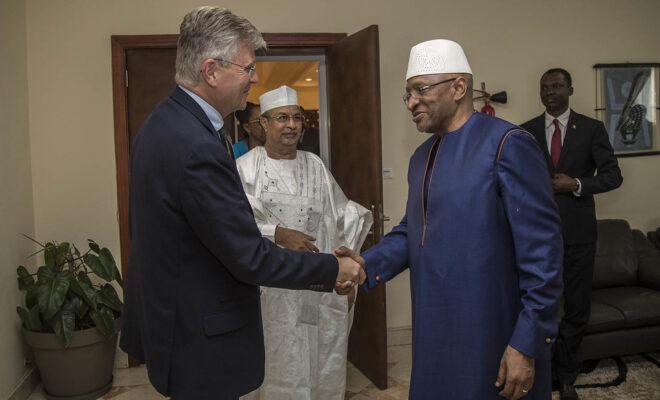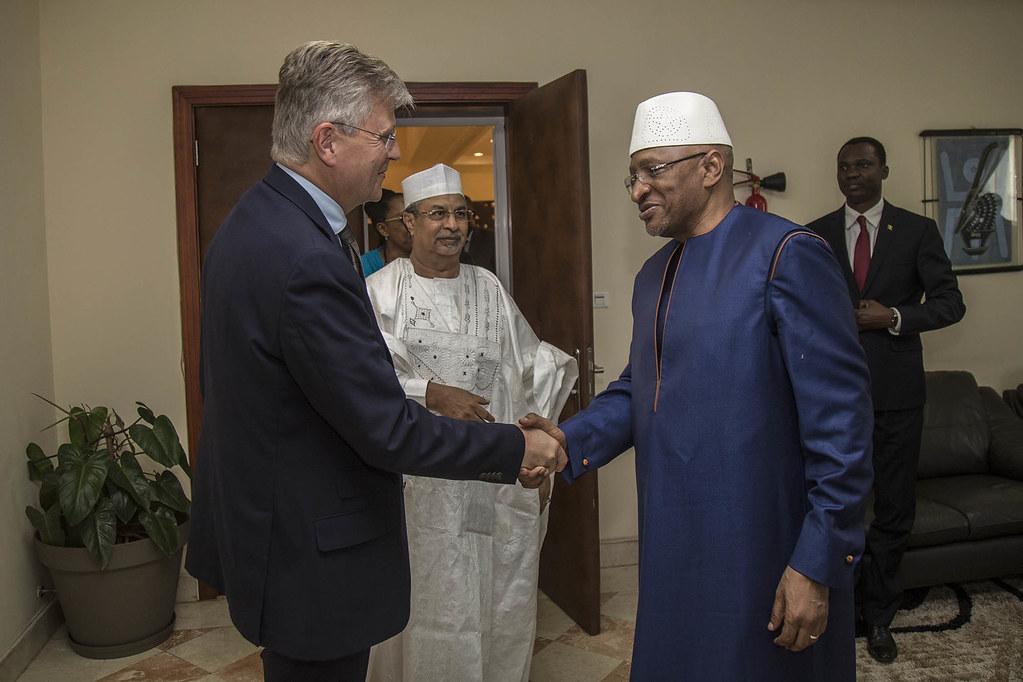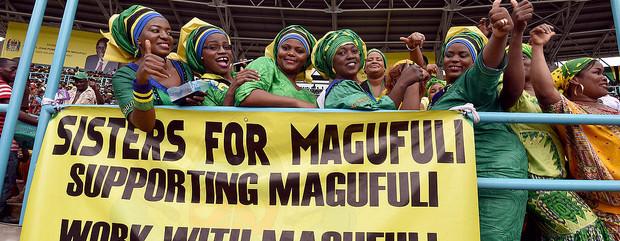Insiders Insight: Mali government quits


Mali Prime Minister Soumeylou Boubeye Maiga (right) resigned last week.Credit: MINUSMA/Marco Dormino.
African Arguments is and always will be freely-accessible to everyone.
But we also have a separate spin-off product called the Africa Insiders Newsletter. It consists of weekly emails with additional snappy insights on topics such as elections, conflict, health and more. It’s for those who want a bit extra and comes with a small subscription fee:
- Regular: $10/month or $100/year
- Patron: $15/month or $150/year. The extra 50% goes straight to funding African Arguments.
- Student/limited income: $2/month or $20/year.
The profits from the newsletter go into funding African Arguments’ free content.
Click here to SUBSCRIBE.
Table of contents:
- The follow-up
- Drone strikes in Tripoli
- Small concessions fail to appease Sudanese protesters
- What everyone is talking about
- Mali’s government quits
- What we are talking about
- South Sudan’s grinding peace
- Health Corner
- One disease, but vastly different outbreaks
- Photo of the week
- Gorilla selfie wins internet
- What else?
- If you have time, read these!
Click here to SUBSCRIBE.
Free segment: What everyone is talking about
Mali government quits
The essentials: Prime Minister Soumeylou Boubeye Maiga announced the resignation of his government on 18 April. After consulting the majority and opposition in parliament, President Ibrahim Boubacar Keita (generally known as IBK) nominated outgoing minister of finance Boubou Cisse as Maiga’s successor, who will now form a new cabinet.
The context: After 1 year and 108 days in office, Maiga actually had one of Mali’s longer stints as prime minister. Including him, only seven of Mali’s 16 Prime Ministers since 1992 managed to stay in office longer than a year.
Maiga was also considered the strongest of IBK’s Prime Ministers and contributed significantly to the latter’s re-election in 2018. IBK stood by Maiga until the end. The international community generally viewed him favourably, especially when compared to the performance of other politicians since the escalation of Mali’s instability in 2012.
In the international press, Maiga’s resignation is mostly interpreted as a result of the devastating massacre of at least 160 ethnic Fulani in central Mali in March. But the massacre and a generally deteriorating security situation was likely only the straw that broke the camel’s back.
Maiga was already under pressure from the powerful clerical establishment of Mali, which had held several mass rallies in Bamako to demand his resignation over Maiga’s perceived insufficient conservatism on social issues. Mali was also rocked by several strikes, while cuts to government budgets didn’t make Maiga any friends either.
Maiga also suffered from insufficient support in parliament. Coming from one of the smaller parties supporting IBK, his elevation created rivalries with the leaders of other parties. The opposition argued that he was responsible for election irregularities that secured IBK’s victory in 2018. Maiga’s resignation preempted a vote by the National Assembly on censure, the first in Mali’s history to be brought jointly by members of the majority and opposition.
The good: Despite being seen as more effective than his predecessors, Maiga clearly didn’t have the situation under control. Maybe a new Prime Minister can do better.
The bad: The likelihood that Boubou Cisse can substantially outperform Maiga is low. On security, it is actually IBK who makes major decisions leaving little room for the Prime Minister to influence events.
The future: Cisse is a respected economist and considered an apolitical technocrat, which may make cooperation with the National Assembly easier. But his appointment will not resolve Mali’s many problems. The country’s political system (which puts the President at the centre of decision making), the continued general intransigence of Mali’s political elite, and an international community primarily interested in short-term suppression of terrorist groups and migration suggests a further deterioration of Mali’s crisis is the likeliest outcome.
- Recommended: Mali : les raisons de la démission de Soumeylou Boubèye Maïga (Jeune Afrique)
- Essential background: Mali: Clerics Rally to Defend Their Class and Weaken the President (Sahel Blog) and Another setback for stability in Mali (ISS)
- Mali : le Premier ministre Soumeylou Boubèye Maïga jette l’éponge(Jeune Afrique)
- Mali government resigns after massacre, insecurity (Reuters)
- Mali President Names Ex-Finance Minister to Lead New Government(Bloomberg)
- Mali : un nouveau chef du Haut conseil islamique succède à l’imam Mahmoud Dicko (Jeune Afrique)
Discuss with @PeterDoerrie on Twitter
Click here to SUBSCRIBE.
The Africa Insiders’ Newsletter is a collaboration between AfricanArguments.org and @PeterDoerrie, with contributions from @_andrew_green and assistance from Stella Nantongo. Part of the subscription revenue is funding in-depth and freely accessible reporting and analysis on African Arguments.





